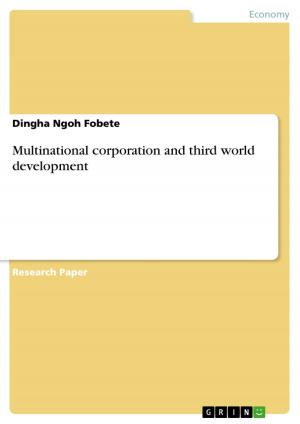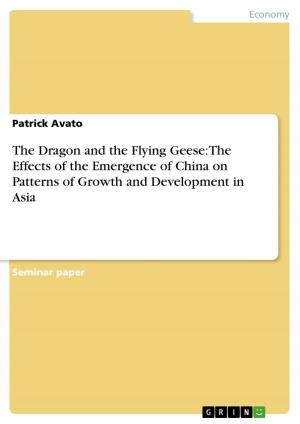Population and Security: Water disputes - on the way to a major global problem?
on the way to a major global problem?
Nonfiction, Science & Nature, Science, Biological Sciences, Environmental Science| Author: | Felix Seidler | ISBN: | 9783640454747 |
| Publisher: | GRIN Publishing | Publication: | October 22, 2009 |
| Imprint: | GRIN Publishing | Language: | English |
| Author: | Felix Seidler |
| ISBN: | 9783640454747 |
| Publisher: | GRIN Publishing |
| Publication: | October 22, 2009 |
| Imprint: | GRIN Publishing |
| Language: | English |
Scientific Essay from the year 2009 in the subject Politics - International Politics - Environmental Policy, grade: 25 von 40 Punkten, The University of Sydney (Center for International Security Studies), course: CISS6008: Population and Security, language: English, abstract: Water is the base of all human existence. First of all for drinking, food production and hygiene, but also for all other developments of contemporaries' human society. The United Nations has estimated world population would grow from 6 to 9,3 billion between 50 years and beside this 'people are getting wealthier' . Thus can be no doubt of a rising global demand for freshwater, but climate change and other environmental factors will lead to short run of water in certain regions. In consequence water can be predicted to become a security issue and a reason for conflict, as it even may be today in some regions. Only 2,5% of all water on the earth is freshwater. 70% of this freshwater is frozen at North and South Pole, 29% are bonded not accessible for mankind as 'soil moisture' and in 'underground aquifers' . About 1% (0,007% of all water) is useable for mankind, but 'water is renewable resource' . This numbers underline the importance of the question, if it is possible supplying all humans with enough water or if water may lead to conflict. Chapter 2 will discuss the questions of waters potential as a reason for dispute, conflict or peaceful development. Dispute is to understand as a political issue while conflict could further mean use of other elements than political including force. Connected to this Chapter 3 will analyse how water disputes and fertility, mortality and migration relate to each other. This is important because developments of the last three factors are highly dependent on fresh water accessibility. As examples for today's water disputes two case studies on Israel/Jordan/Syria/Lebanon and Turkey/Syria/Iraq will be made. Even if such an answer is difficult to make, chapter 5 will try to answer the main question if water will become a major security problem in the 21st century and if water disputes will lead to conflicts. In context of population growth and climate change this will be an important topic for 21st centuries politics. The terms `conflict´ or `major conflict´ do necessarily contain war or violence. Water disputes could possibly lead to violent conflict, but when the term `conflict´ is used here it means conflict in general and not specifically war or violence.
Scientific Essay from the year 2009 in the subject Politics - International Politics - Environmental Policy, grade: 25 von 40 Punkten, The University of Sydney (Center for International Security Studies), course: CISS6008: Population and Security, language: English, abstract: Water is the base of all human existence. First of all for drinking, food production and hygiene, but also for all other developments of contemporaries' human society. The United Nations has estimated world population would grow from 6 to 9,3 billion between 50 years and beside this 'people are getting wealthier' . Thus can be no doubt of a rising global demand for freshwater, but climate change and other environmental factors will lead to short run of water in certain regions. In consequence water can be predicted to become a security issue and a reason for conflict, as it even may be today in some regions. Only 2,5% of all water on the earth is freshwater. 70% of this freshwater is frozen at North and South Pole, 29% are bonded not accessible for mankind as 'soil moisture' and in 'underground aquifers' . About 1% (0,007% of all water) is useable for mankind, but 'water is renewable resource' . This numbers underline the importance of the question, if it is possible supplying all humans with enough water or if water may lead to conflict. Chapter 2 will discuss the questions of waters potential as a reason for dispute, conflict or peaceful development. Dispute is to understand as a political issue while conflict could further mean use of other elements than political including force. Connected to this Chapter 3 will analyse how water disputes and fertility, mortality and migration relate to each other. This is important because developments of the last three factors are highly dependent on fresh water accessibility. As examples for today's water disputes two case studies on Israel/Jordan/Syria/Lebanon and Turkey/Syria/Iraq will be made. Even if such an answer is difficult to make, chapter 5 will try to answer the main question if water will become a major security problem in the 21st century and if water disputes will lead to conflicts. In context of population growth and climate change this will be an important topic for 21st centuries politics. The terms `conflict´ or `major conflict´ do necessarily contain war or violence. Water disputes could possibly lead to violent conflict, but when the term `conflict´ is used here it means conflict in general and not specifically war or violence.















